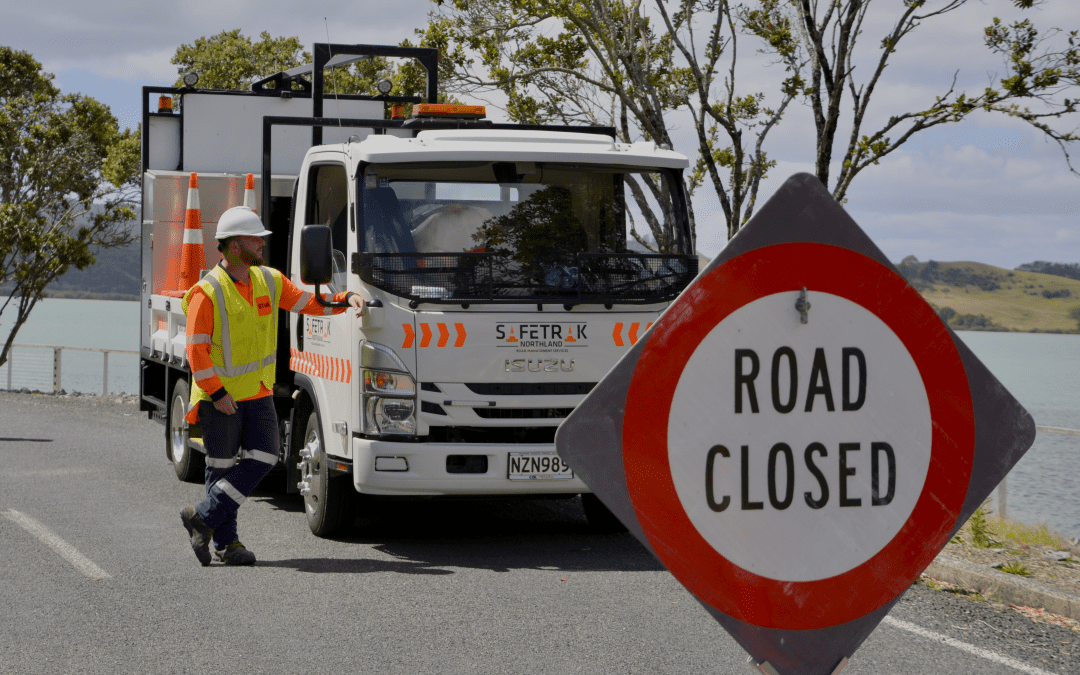Safetrak Northland – A Project Traffic Management Plan (PTMP) is a document that outlines how the traffic impacts of a construction or development project will be managed and mitigated. A PTMP is essential for ensuring the safety of workers, pedestrians, motorists, cyclists and other road users and minimising disruptions and delays to the normal flow of traffic.
A PTMP is a vital tool for ensuring that roadworks are carried out safely, efficiently, and with minimal impact on the public. By following a TMP, roadwork contractors can avoid delays, fines, lawsuits, and reputational damage. A TMP can also improve the quality and durability of the roadwork outcomes, as well as the satisfaction and trust of the road users.
What Is a Project Traffic Management Plan?
A PTMP typically includes the following elements:
- A description of the project scope, location, duration and phases.
- A traffic impact assessment that identifies the potential traffic hazards, risks and impacts of the project.
- A traffic control plan that specifies the types, locations and timings of traffic control devices and signage to be used.
- A traffic management team that assigns roles and responsibilities for implementing and monitoring the PTMP.
- A communication plan that informs the relevant stakeholders and the public about the project and its traffic impacts.
- A contingency plan that anticipates and prepares for possible emergencies or unforeseen events that may affect the traffic situation.
Why Is Having a Project Traffic Management Plan Important?
A PTMP is important in construction projects since it:
-
- Ensures the safety of workers, road users and pedestrians by identifying and mitigating potential hazards and risks.
- Minimises the disruption and inconvenience to the public by planning for alternative routes, detours, signage, traffic control devices and communication strategies.
- Complies with the legal and regulatory requirements of the relevant authorities, such as local councils, state agencies and road authorities.
- Coordinates with other stakeholders, such as utility providers, emergency services and public transport operators, to avoid conflicts and ensure smooth operations.
- Monitors and evaluates the effectiveness of the traffic management measures and makes adjustments as needed to respond to changing conditions.
A traffic management plan is a vital component of any project that involves working on or near public roads. It helps ensure that the project is delivered safely, efficiently and with minimal impact on the community.
What Benefits Can You Get from a Project Traffic Management Plan?
A PTMP should be developed in consultation with the local authorities, road agencies, utility providers, emergency services and other relevant parties. It should also be reviewed and updated regularly to reflect any changes in the project or the traffic conditions.
The benefits of a PTMP are manifold. A well-designed and executed PTMP can:
-
- Enhance the safety of all road users and reduce the risk of accidents and injuries. For example, a Project Traffic Management Plan for a road-widening project may include installing temporary barriers, reducing speed limits, providing adequate lighting and visibility, and enforcing strict traffic rules.
- Improve the efficiency of the project delivery and reduce the costs associated with delays, rework and claims. For example, a PTMP for a bridge construction project may include measures, such as coordinating with other contractors, scheduling work during off-peak hours, optimising the use of resources and equipment, and monitoring the progress and quality of work.
- Maintain or improve the level of service and accessibility for the surrounding community and businesses. For example, a PTMP for a railway station upgrade project may include measures, such as providing alternative routes and modes of transport, maintaining pedestrian access and connectivity, minimising noise and vibration impacts, and engaging with the local community and businesses to address their concerns and expectations.
- Reduce the environmental impacts of the project, such as noise, dust, emissions and waste. For example, a PTMP for a landfill expansion project may include measures such as implementing dust suppression systems, using low-emission vehicles and machinery, segregating and recycling waste materials, and restoring the site after completion.
- Increase the public’s confidence and satisfaction with the project and its outcomes. For example, a PTMP for a park redevelopment project may include measures, such as displaying clear and informative signage, providing regular updates and feedback channels, involving the public in the design process, and delivering a high-quality product that meets or exceeds the public’s needs and preferences.
A Project Traffic Management Plan is not only a legal requirement but also a best practice for any project that involves significant traffic impacts. By developing and implementing a PTMP, project managers can ensure that their projects are delivered safely and efficiently while minimising the negative effects on the road network and the community.
Consult Safetrak Northland for All Your Traffic Needs!
When it comes to traffic management in NZ, Safetrak Northland is the leading traffic management services provider. For the past five years, Safetrak Northland has been involved in traffic management and control. Over the years, we’ve served a diverse range of customers and clients. It attests to the high quality of our services. Safetrak Northland is a group of traffic management experts who can assist with all aspects of traffic management and control. We service a wide range of areas throughout New Zealand, from Cape Reinga to Whangarei.
We’ve been in the industry for five years and have served a variety of clients over the years. The quality of service we provide is trusted by our customers.
Safetrak Northland is a locally owned company based in Kaitaia that offers a variety of roading and infrastructure services. The company specialises in traffic control and management, ensuring the safety and efficiency of drivers and workers on the road.
Safetrak Northland also provides hydroexcavation and cable locating services, removing soil and debris and locating underground utilities with advanced equipment and techniques. Safetrak Northland employs a team of qualified and experienced employees who are dedicated to providing high-quality service and customer satisfaction. Since its inception in 2019, the company has worked on a variety of projects throughout the Northland region. Safetrak Northland is honoured to be a dependable partner in road and infrastructure solutions.
We prioritise safety, dependability, and making our customers happy. Contact us today and we’ll help you with any of your traffic needs!


